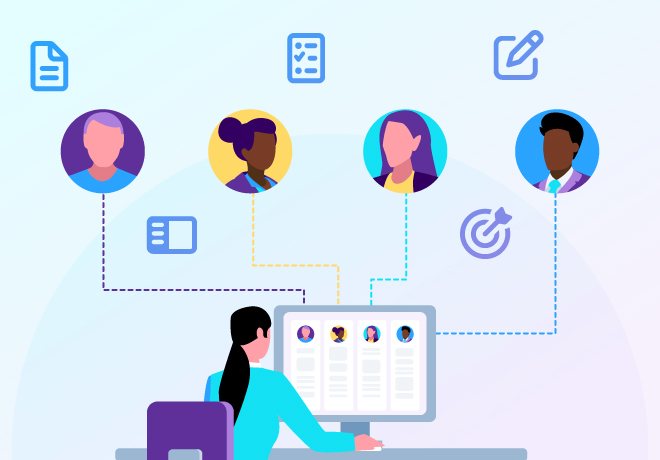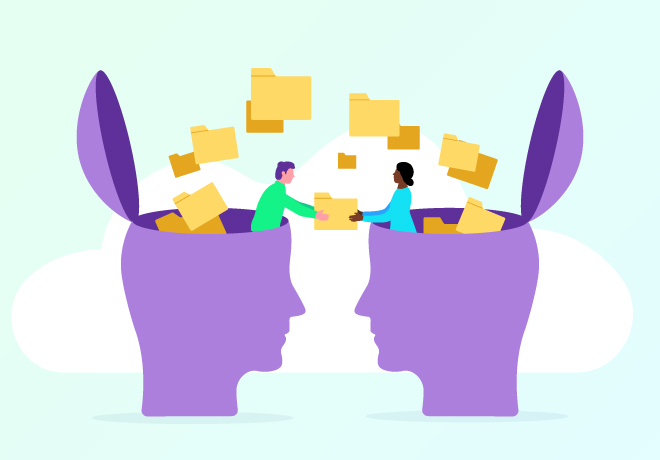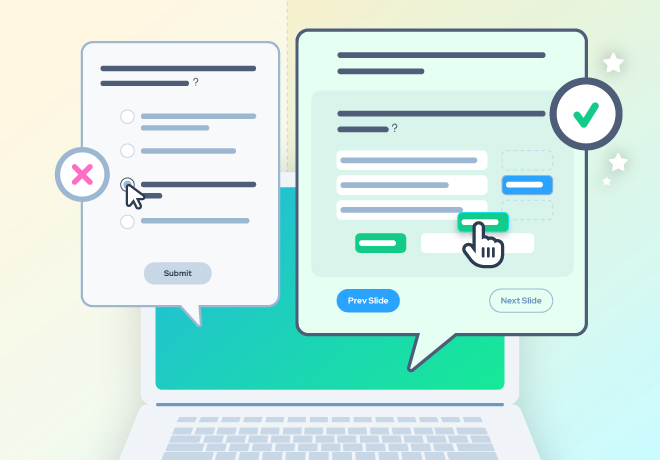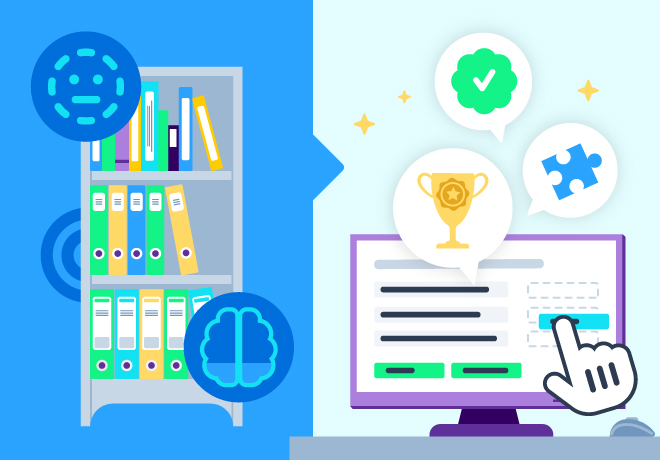
What are the advantages of an eLearning course library?

Related articles
Get valuable eLearning insights to your inbox.
Listen to Neovation’s Demystifying eLearning podcast generated with NotebookLM!
Listen to our podcast on your favorite platform!
Once upon a time… in a major industrial city, there were two widget factories.
Chief Training Officers Betty and Bob were friendly competitors, with their widget-making factories on opposite sides of town. Given how hot the widget market was, they always tried to outdo each other and liked to brag about their wins when they got together at local industry events.
One March, the conversation turned to online training. Both had decided to implement an LMS at the beginning of that same year, and here it was, almost the end of the first quarter, so they were comparing progress, each looking to one-up the other.
Bob was surprised to hear that Betty had already been putting her team through various training modules and issuing certificates of completion for some of her learning tracks. Bob knew from their pre-holiday conversations that, just like him, Betty didn’t have any training materials ready to go – so how could she have been putting people into courses so quickly? He had to know!
Betty finished her drink and smiled. “You can’t expect me to give away all my competitive secrets, Bob! I had my team in courses within a week of launching our LMS. Sorry, not sorry, to hear your team is still waiting for your training to roll out. Time to go! See you next quarter.” And with that, Betty paid the tab as a consolation prize and headed home for a good night’s sleep, knowing that she really did have a huge competitive advantage.
What was Betty’s secret?
Introducing packaged content – your eLearning course library
In case you haven’t read my earlier post, “What is an eLearning content library,” I’m happy to define what an eLearning course library is and is not.
What it is, generally speaking, is a subscription-driven collection of pre-built online courses created by subject matter experts that is compatible with most LMS platforms. Depending on the platform’s pricing model, you may be able to pick and choose courses, paying only for what your learners consume, or you may have access to the entire library or major sections of their course offerings for a flat or scaling fee. This may vary by provider, and if you are accessing your library of pre-built course content as part of the purchase of your learning management system, it may be bundled into your overall investment.
Simply put – an eLearning course library is a veritable buffet of courses that you can select, upload and assign to your learners as soon as your learning management system is properly configured for your needs.
What it is not, in the majority of cases, is a complete replacement for building customized courses specific to your company’s training objectives. It is a nutritional supplement to your own bespoke or custom courses that speak to your company’s internal workings, rules, regulations, processes, and standards, not a meal replacement.
Custom-built courses require a long-term investment of both time and money before they can be launched. Make no mistake – it’s worth the investment and the wait – but why delay starting training when professional-grade courses are available?

An eLearning course library can help you maximize your investment in your own custom courses. Instead of “reinventing the wheel” – as it were – building courses on commonly taught topics. You can curate a selection of pre-made courses that will provide your team with the training they need. A quick deployment helps you and your team set expectations and establishes good learning habits. No need for your learners to sit idle while you complete the more in-depth brand – and industry-specific courses you need.
The advantages of an eLearning course library
Start training your team “today” – As soon as your learning management or microlearning system is properly provisioned, upload the platform-compatible courses, and assign your learners to start training. Kickstart your learning culture as early as possible to engage your learners as quickly as possible. Make the launch of your LMS an event that you can celebrate!
Choose from a broad selection of course material – You have access to tens of thousands of courses on various topics taught by professional instructors. Some course libraries offer courses in languages other than English. There may be courses offered in a series to improve skills from beginner to advanced. Even if you have access to an entire library, you can pick only the courses you want to deliver. Depending on the nature of your subscription, you may choose to make the entire catalog available to your learners for their own optional personal development – if that doesn’t have an impact on your price.
The course catalog might almost be enough – Depending on your industry and your training objectives, a comprehensive eLearning library may cover almost all the course material you want to offer if your focus is primarily on
- Leadership training
- First aid, health, and safety training
- Basic computer and software skills (spreadsheets, word processing, presentations, etc.)
- Hospitality and customer service
- Selling skills
- Productivity and time management
- And other soft-skills topics.

Create a baseline – An eLearning library can provide entry-level courses that establish a team-wide baseline before moving on to more in-depth and brand-specific training. It allows you to assess any knowledge gaps early, and may inform your custom training course content to ensure those gaps are filled to improve knowledge retention.
Save here to invest more there – When you access affordable pre-made content, that may free up precious budget dollars for your custom courses, allowing you to invest more fully in high-quality bespoke content built to dive deep and deliver on your company-specific areas of expertise. No need to invest in building “entry-level or foundational” type courses if they already exist
Manage your learners, not your course content updates – The responsibility of keeping courses current and meeting accessibility standards, as well as meeting your quality expectations, is on the provider – freeing up your content design team (either in-house, hired agency, or hybrid) to focus on the courses they have under construction – while your team is taking training from day one. Popular soft-skills topics like digital marketing require constant update as platforms change and strategies evolve. That’s a lot of ongoing maintenance.
World-class instructors – Many high-profile thought leaders offer pre-made courses, and many non-famous instructors are certified experts in their field. For broad-appeal courses like customer service – why not learn from the best, and supplement the rest with a few additional bespoke courses to round out the curriculum?
The disadvantages of an eLearning course library
An additional expense – When you were budgeting for your online training program, you likely had the following items line-listed as areas of investment – training platform, onboarding/implementation, data transfer/integrations, and custom course content. Because eLearning library content cannot fully replace all the content you may want to deliver, a content library subscription does add another line to the investment list. Shifting some dollars to pre-made courses does mean faster deployment, which maximizes your investment in your training platform by not letting it sit unused.
Not your brand, not your content – Generic content is exactly that – branded to the Library Provider, or in some cases, to the instructor, especially if they are an industry-recognized thought leader. You have no control over the look, feel, design, timing, etc., of the courses. As long as the courses are well-produced, accessible, and accurate – your learners will still learn what they need to learn.
Not all the information will be a perfect fit – eLearning library courses are designed to be broad in scope and more generic in their approach to the information they convey, so they meet the needs of a wide range of businesses. Not all the information will apply specifically to your business case, and that’s okay. You can use your custom courses to refine the more general training to be company-specific as your learners advance to your “next-level” of instruction.
The advantages of custom course creation
Your SMEs, your message – You’ll have total control over the content, and be able to refine it specifically to deliver on your company’s unique training objectives. You have a wealth of knowledge about your business in-house, and building your own courses allows for knowledge capture from your senior employees (and others) before you lose them to retirement. The brain drain is a real challenge as the demographics of the workplace shift over time. You can build on the “entry-level knowledge” of pre-made courses by using your in-house expertise to really deliver high-value detailed, and specific training. Your SMEs will thank you for allowing them to dive deeply into their pool of experience and knowledge.
Your brand, look and feel – You’ve invested a lot in team-building around your brand and proudly fly your corporate logo, colors and messaging in all your internal and external communications. Your custom-made courses will match your corporate branding, speak your “inside-baseball” language, and feel like they are an integrated part of your learning and development offering.
Ability to revise, update, and correct – As your business needs shift or new roles or equipment are deployed, you can update your course material to reflect changes within your company structure or methodology. Updating your courses is an essential part of change management and helps reduce employee churn by helping employees with both reskilling and upskilling to keep them engaged and productive.
The disadvantages of custom course creation
The investment – No doubt about it, creating custom eLearning courses requires a significant monetary investment. You may have an inhouse team of L&D specialists that can build your courses, or you may need to engage an outside agency, like Neovation’s Flare Learning team, to work with your SMEs to create your course materials. We see more and more companies use a hybrid approach – where they use an agency to supplement the work of their in-house team.
The time – Like fine food, great courses can take time to prepare. When you are building a course from scratch, you will need to follow a consistent process to ensure knowledge capture, timely delivery and quality assurance. While there can always be efficiencies, good quality work requires specialized skills and attention to detail – both of which require enough time to ensure the job is done right the first time, every time.
It takes a team – I mentioned specialized skills, and you will need to build or hire a team that has them all to ensure your courses are the best they can be. Some of the roles within a typical learning and development team are:
- Learning consultant
- Project Manager
- Instructional Designer
- eLearning Designer
- Multimedia Specialist
- eLearning Developer
- Quality Assurance Tester
- Subject Matter Experts
- Content Writer
- Project Coordinator
Some of these roles may be conflated, depending on the size of your team and your hiring budget, but each one involves a specific set of skills and different responsibilities when it comes to producing your course content.
Be like Betty – use an eLearning course library as your competitive advantage
Coming back to our story of Bob and Betty for a minute. Now you know how Betty had such a competitive advantage over Bob, maximizing her investment in her new LMS by being able to deploy high-quality training to her team right away while her custom courses were being developed by her team. The extra budget she invested in pre-made courses paid off, as she could roll out her new LMS with some fanfare and engage her team in training right away. She chose topics that everyone could benefit from to establish a baseline understanding before moving on to her bespoke company-specific training in the weeks and months ahead.

There are many eLearning course libraries available, and each has their own set of pricing and policies. Some are more focused on individual enrichment-type courses, and others may specialize in an industry to a topic like compliance or health and safety.
How do you find the right eLearning course library for you?
Our recommendation is to talk to one of Neovation’s eLearning advisors about what your training objectives are and what your budget is for course development. We can help make informed recommendations about what will work for you. We are partners with a couple of industry-leading eLearning course libraries and knowledgeable about what else is available out there – and we can help you find what will meet your needs and your budget. And if you’re looking for a course delivery platform, we can also help with that.
Betty likes to be the best – and she was thrilled to have beat out Bob on getting her team invested into training. You can be like Betty and use eLearning content libraries as your secret competitive advantage to roll out training to your team and start building a company-wide learning culture with no time to spare!

With 15+ years of online marketing and online learning experience, Susan loves to share insights about where these two ROI-building practices can intersect and complement each other for your business or organization.
Become part of our L&D community
We publish a new learning hub article — full of useful, practical topics — weekly.
Not sure where where you want to start? Jump into one of our recently published articles and see where it takes you!








-svg.svg)
-svg.svg)
-svg.svg)
-svg.svg)